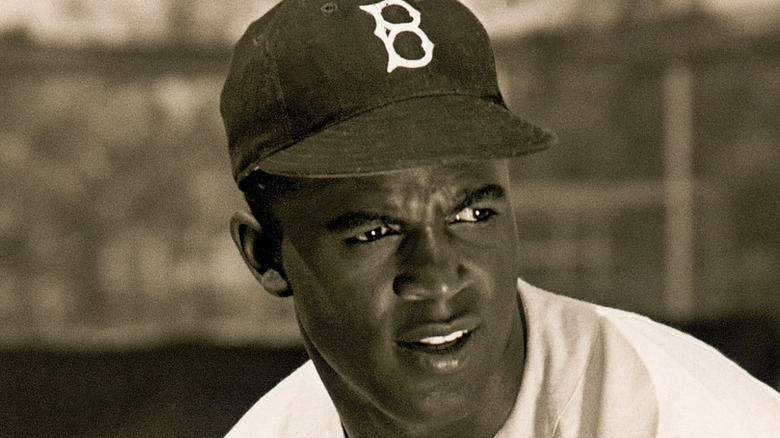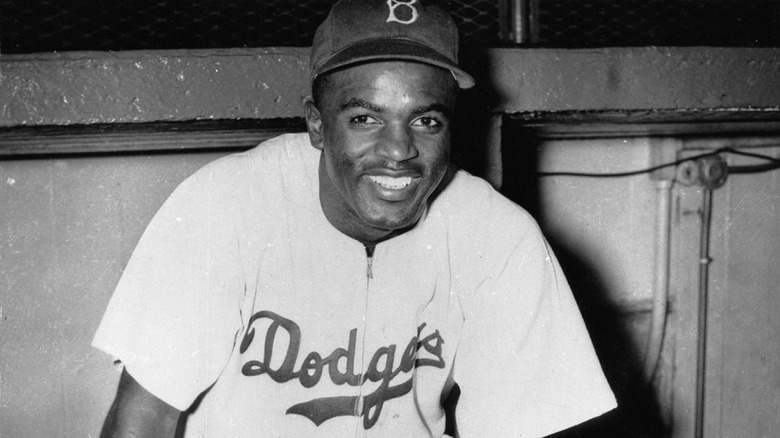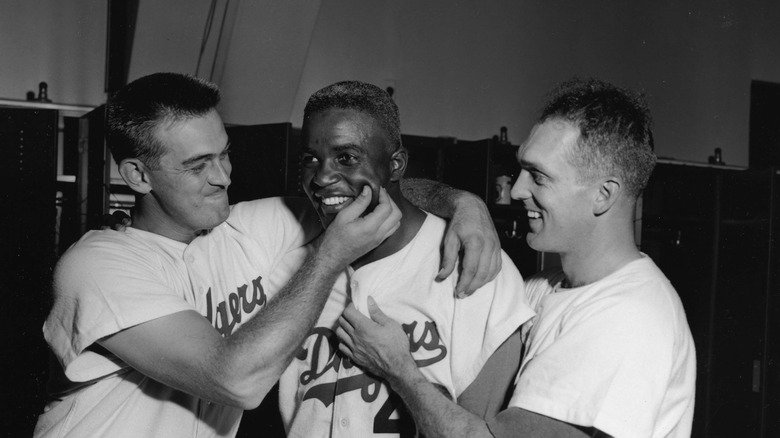The Truth About Jackie Robinson's Involvement In A Street Gang
The list of hardships Jackie Robinson had to endure before, during, and after his Major League Baseball career would, if listed here, run this article to thousands of words. A few of the key points, simply by way of illustration, include being born to a family of sharecroppers in Georgia, per the Georgia Historical Society, his father leaving the family when he (Jackie) was a boy, a court-martial in the Army after he stood up to a racist bus driver, per PBS, and the St. Louis Cardinals threatening to refuse to play against his Brooklyn Dodgers if he took the field, per the St. Louis American, among multiple others.
Despite the hardships growing up, ESPN writer Howard Bryant once said Robinson could have gone pro in any sport he wanted. "You could make an argument that Jackie Robinson was the greatest athlete in American history," Bryant once said, per California Sun. And he honed his skills growing up in Pasadena, California, at 123 Pepper Street, according to L.A. Curbed.
Sports was not the only thing Robinson got into as a young man. For a time in his childhood, Robinson engaged in an activity that many other poor, minority youth engage in to this day: He joined a street gang with some other non-white kids from his neighborhood. Fortunately, the gang's activities had less to do with drive-by shootings and dealing drugs, like the Bloods or Crips of today, and more to do with youthful shenanigans that actually seem downright quaint by comparison.
The Robinson family was not accepted in their new 'hood
After Jackie Robinson's father left the family when he (Jackie) was a small boy for "another woman," according to The Orange County Register, his mother took him and his four siblings to Pasadena, California, to start over. Though the town was and is relatively affluent, Robinson and his family lived in poverty as his mother worked a series of odd jobs. Still, his mother went from living in Georgia to working hard enough in California to eventually buy a house with another family in 1922, becoming the full owner a couple of years later.
The community was mostly white, save for Robinson and a handful of Asian and Latino kids, and in Robinson's case, he only had a single mom who worked to support the family. She could not always be home, and Robinson and the other non-white neighborhood kids found themselves excluded from organized sports and other activities available to white kids. Ultimately, as young, bored teens often do, they found mischief.
It was the Jim Crow era, and though slavery had been abolished years before, laws and codes against racial mixing were in full effect. "Pasadena regarded us as intruders," Robinson once said, according to Boom California. It was so bad that at one point a cross was reportedly burned on the Robinson family front lawn, per California Sun.
The Pepper Street Gang didn't do much damage
In response to being unaccepted in the community and not allowed to be part of the same activities as the white kids, the rejected neighborhood boys banded together and formed the Pepper Street gang, according to the Georgia Historical Society. The gang's criminal activities were limited to relatively minor offenses like stealing fruit, vandalizing cars with dirt clumps, and stealing golf balls and selling them back to the golfers.
According to California Sun, another thing the gang would do was to make bets with the white kids that they would beat them at sports or other games kids played at the time. When the Pepper Street gang won, they took the money they made from the bet. Little did those white kids know they were going against one of the best budding athletes in American history, who would go on to become the first Black baseball player in Major League Baseball when he joined the Brooklyn Dodgers in 1947, per Biography.
Despite the borderline trivial nature of the gang's crimes, life as an outlaw does not bode well for a young boy who wants to get out of poverty. Fortunately, according to the Georgia Historical Society, a local reverend took an interest in Robinson and helped him navigate his way out of being a local hooligan — to revive an antiquated word. After entering college, Jackie Robinson's star started to shine. California Sun reported at UCLA, the natural athlete lettered in not only baseball, but also track, football, and basketball.


